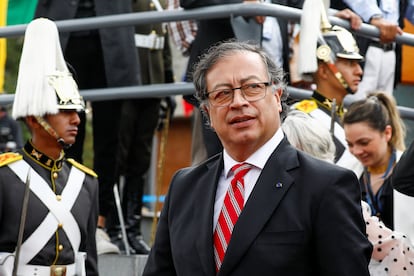The fall of Colombia’s peace commissioner puts other ministers on alert: ‘No one is untouchable’
President Gustavo Petro wants results in the short term, and will not hesitate to dispense with whoever is necessary

“No one is untouchable,” slips a source from the Casa de Nariño, the presidential residence of Colombia. President Gustavo Petro wants results in the short term that will pull his government out of its lethargy, and to do so he will not hesitate to dispense with whoever is necessary, as evidenced with Peace Commissioner Danilo Rueda, who was dismissed overnight. Cabinet members know that, at this point, none of them are indispensable. The president, these same sources insist, considers that things are going very slowly and that he has already given too much time to projects that have not yet gotten off the ground.
Petro has a reputation for ruthlessly cutting off heads since his time serving as mayor of Bogotá, between 2012 and 2015. It was common for him to trigger crises that ended with new appointments in the most relevant positions. Those who know him point out that he can be patient, but that from one moment to the next, he can also act bluntly. Rueda’s case serves as an example to other officials. In recent weeks there have been rumors about changes to ministerial portfolios and advisory positions, although for now these are largely rumors. But everyone is on high alert. “The president is upset at not getting results soon,” said the source.
There are several signs that Rueda’s dismissal caught those involved off guard, despite the fact that the high commissioner had suffered some obvious wear and tear and there were even lawmakers who were insistently asking for his resignation. The decision had not been discussed in his close circles. The Office of the High Commissioner for Peace had even called a press conference for Thursday that had to be canceled after the president’s message. Beyond a brief presidential message on X, formerly Twitter, the government is keeping quiet about what triggered the decision.
In the Government of Total Peace, as Petro’s administration bills itself, there is simultaneous dialogue with all armed groups, and the position of the Peace Commissioner takes on enormous relevance. It is the president’s flagship policy, for better or for worse. Rueda imbued the position with his personality. His critics point out that he often fell into improvisation in a position that requires strategy. Along the way, he had friction at various times with the Minister of Defense, Iván Velásquez.
In his year and a half in power, the president has already had two major cabinet crises. There have already been 30 ministers, some portfolios have already had up to three people in charge, and only seven of the original 18 ministers remain (Foreign Affairs, Defense, Justice, Labor, Environment, Housing and Trade).
Speculation about the ministerial readjustments — which in Colombia is known colloquially as cabinetology — has been going on for months. Rueda’s dismissal could be the prelude to a moment of expectation about a political opening to include other sectors, meaning the national agreement that Petro often invokes. The executive has entered into talks to assemble (or reassemble, technically) a broader coalition that will allow the government to process a legislative agenda that includes reforms that are facing a lot of resistance, especially those affecting health. This week, Petro held two key meetings that showed a more conciliatory mood, one with entrepreneurs and another with former president Álvaro Uribe.
Sign up for our weekly newsletter to get more English-language news coverage from EL PAÍS USA Edition
Tu suscripción se está usando en otro dispositivo
¿Quieres añadir otro usuario a tu suscripción?
Si continúas leyendo en este dispositivo, no se podrá leer en el otro.
FlechaTu suscripción se está usando en otro dispositivo y solo puedes acceder a EL PAÍS desde un dispositivo a la vez.
Si quieres compartir tu cuenta, cambia tu suscripción a la modalidad Premium, así podrás añadir otro usuario. Cada uno accederá con su propia cuenta de email, lo que os permitirá personalizar vuestra experiencia en EL PAÍS.
¿Tienes una suscripción de empresa? Accede aquí para contratar más cuentas.
En el caso de no saber quién está usando tu cuenta, te recomendamos cambiar tu contraseña aquí.
Si decides continuar compartiendo tu cuenta, este mensaje se mostrará en tu dispositivo y en el de la otra persona que está usando tu cuenta de forma indefinida, afectando a tu experiencia de lectura. Puedes consultar aquí los términos y condiciones de la suscripción digital.








































